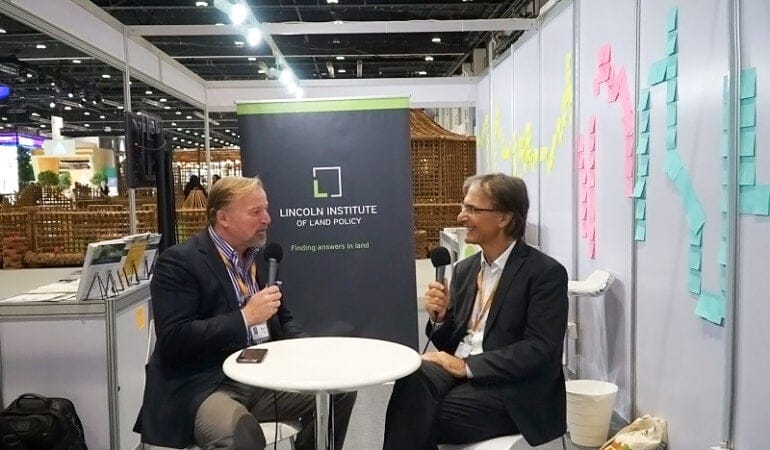
Land Matters Podcast
The rhythmic calls to prayer could be heard throughout the days of the United Nations global cities summit, the World Urban Forum 10, in Abu Dhabi earlier this month—a constant reminder of the vast cultural diversity that is threaded through worldwide efforts to improve conditions in fast-growing metropolitan regions.
It was the first time the biennial conference was held in the Middle East, in some ways a counterintuitive place to talk about sustainability, in a part of the world better known for producing and consuming carbon-emitting fossil fuels. Yet some 13,000 delegates, non-governmental organizations, and practitioners coalesced under the stated theme of fostering innovation and respecting local culture—the suggestion being that good ideas for better functioning cities are desperately needed and welcome wherever they come from.
The summit “was about recognizing that many of our major social, political, and ecological issues are driven by competing and oftentimes irreconcilable demands for land and natural resources,” said Enrique Silva, director of international initiatives at the Lincoln Institute. “We talked openly about creative ways to manage those competing demands, especially through the use of land-based financing tools that try distribute the burdens and opportunities of urban development more equitably.”
During the six-day conference, representatives of the Lincoln Institute and its partners promoted new ways of financing the critical infrastructure needed to improve quality of life and provide decent housing for the estimated four billion people living in cities today. They shared the experiences of several places that have tried different versions of one major financing innovation, land value capture (also known as land value return), from São Paulo, Brazil, to Colombia, India, Europe, Japan, and beyond. The question of resources and investment is paramount as the world adds the equivalent of a city the size of Madrid each month.
The organizing agency for the summit, UN-Habitat, vowed in the concluding declared actions to accelerate implementation of the Sustainable Development Goals, among other global frameworks guiding more sustainable and inclusive cities worldwide.
In Episode 10 of the Land Matters podcast, a veteran of the World Urban Forum, architect and urban planner Claudio Acioly—who led a popular training session on affordable housing and addressing the rampant challenge of informal settlement or slums, along with senior fellow Martim Smolka and researcher Cynthia Goytia—helped pull together the different threads of the conference. The interview was recorded live at the Abu Dhabi National Exhibition Centre.
You can listen to the show and subscribe to Land Matters on Apple Podcasts, Google Play, Spotify, Stitcher, or wherever you listen to podcasts.
Further Reading
Sustainable Urbanization: Lincoln Institute to Share Land Use Innovations at World Urban Forum 10, Land Lines
What Abu Dhabi’s Future Looks Like Now, CityLab
Land Matters Podcast: In Praise of Global Agreements, Land Lines
Anthony Flint is senior fellow in the Office of the President at the Lincoln Institute of Land Policy.
Photograph: Anthony Flint talks with architect and urban planner Claudio Acioly at the Lincoln Institute booth at World Urban Forum 10. Credit: Adrienne Acioly.
